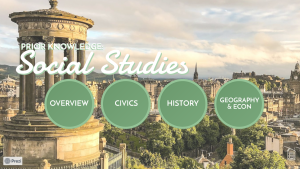47 Prior Knowledge: Social Studies
Learning Objectives
-
Establish a baseline of prior knowledge for social studies concepts in order to prepare for Social Studies GED Exam.
-
Develop self-directed learning skills to facilitate student success and college and career transitions such as self-advocacy, critical thinking, organizational skills and curiosity.
Chapter & Discussion
This chapter includes a study guide that can be navigated in a classroom setting or independently. You can access the study guide via the link below.
GED Prior Knowledge: Social Studies
Work through the different sections of the chapter and discuss ideas and topics as they arise. If you’re working independently, take notes instead. Notes and active discussion will be helpful in navigating this week’s assignments.
Note on Study Guides
Study guides in this textbook are specific in-depth modules designed to be navigated via the attached presentation. The chapter below will offer general information on this week’s topics. For a deeper look at these topics, please access the presentation linked above.
Overview
A majority of reading comprehension comes from your ability to connect what you’re reading to something you already know.
The Social Studies GED Test is a reading comprehension test specifically for the type of reading that appears in science articles and journals. It will also ask you to comprehend visual data (charts, graphs, political cartoons, and maps).
The test won’t require you to memorize any facts, names, or dates, but it will assume that you have some background knowledge on the topics it covers.
Today, we’ll go over the foundation of prior knowledge that the GED Social Studies Test expects you to be familiar with.
Civics
This is the study of political science. It will mostly deal with items related to the US government. The GED wants you to have working knowledge about:
- Different types of government
- The United States Constitution
- Branches of US Government
- Electing the US President
- Rights and Responsibilities of Citizens
About 35% of the questions will relate to civics.

History
This is the study of past human behavior. This test will focus on US History. The GED wants you to have working knowledge about:
- US Revolution
- Westward Expansion/Colonialism
- The US Civil War
- The Industrial Revolution and the Great Depression
- The Civil Rights Movement
About 35% of the questions will relate to history.
Geography and Economics
Geography is the study of people and places. Economics is the study of people and resources. The GED would like you to have working knowledge about:
- Relationships between people and places
- Parts of a map, how to read a map
- Economics concepts: resources, exchange, and production
About 30% of the questions will relate to geography and economics.

Assigned Reading
Here are this week’s readings. Additionally, please read for your own personal enjoyment for 1/2 hour each day. This will be called your “Reading Zone” reading and it will coincide with many upcoming activities.
GED Study Guide: Social Studies (via GED.com)
Problem Set: Practice Your Skills!
Problem Set 3: Geography & Economics
Completing problem sets like this can be an important element of independent study towards completing your HSE. I write these to resemble the style of questions you’ll find on the RLA and Social Studies GED tests.
Assignment: Social Studies Concepts Self-Test
For each of the following concepts, write a short (one sentence or less) definition or explanation. Do this from memory.
Then, go over your answers using the lecture notes. Highlight concepts in green if you feel confident and red if you need to go over them again.
Democracy
Monarchy
Constitution
Legislative Branch
Veto
Electoral Vote
Declaration of Independence
Reservation
Abolition
Secede
Industrial Revolution
Rural & Urban
Civil Rights
Compass Rose
Latitude & Longitude
Goods and Services
Consumers & Producers
Assignment: Reading Zone Response (250 Words)
For Reading Zone, you must find a novel that is interesting to you and enjoyable to read. If you need help finding a Reading Zone book, please ask. Please read your Reading Zone book for a half-hour each day. On class days, there will be time in class dedicated to reading.
Create a two-paragraph response to the reading you did this week. The first paragraph should summarize what you read this week. The second paragraph should address the following prompt:
What are some of your criticisms of this book? What things would you have wanted to see more of? What could have been done differently?


